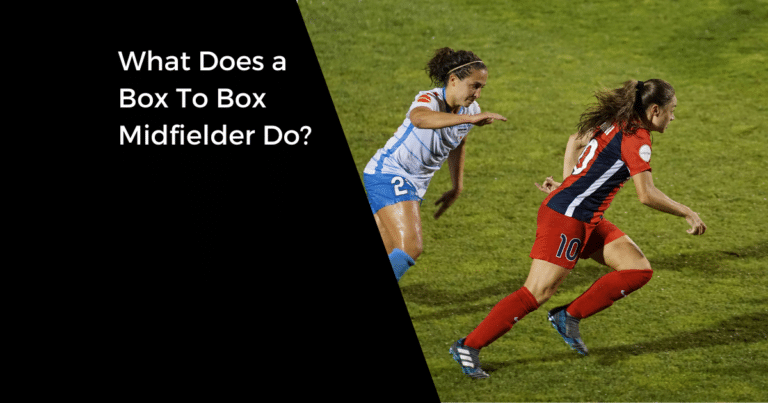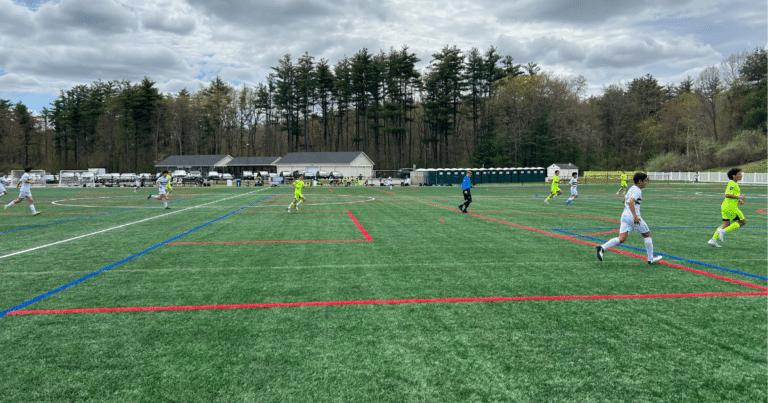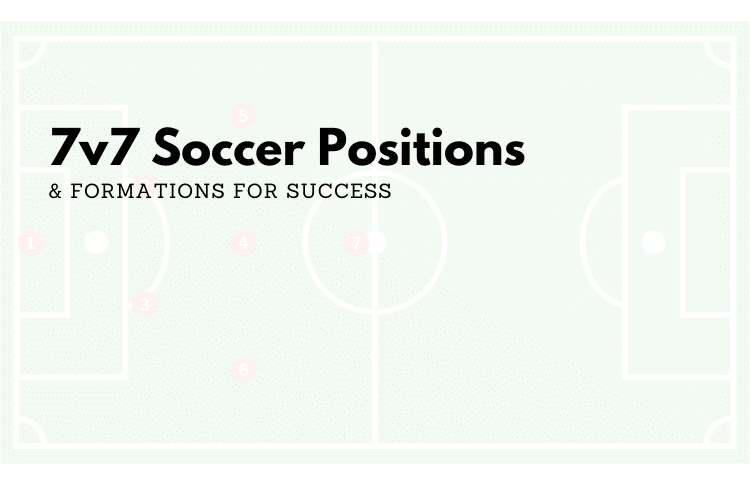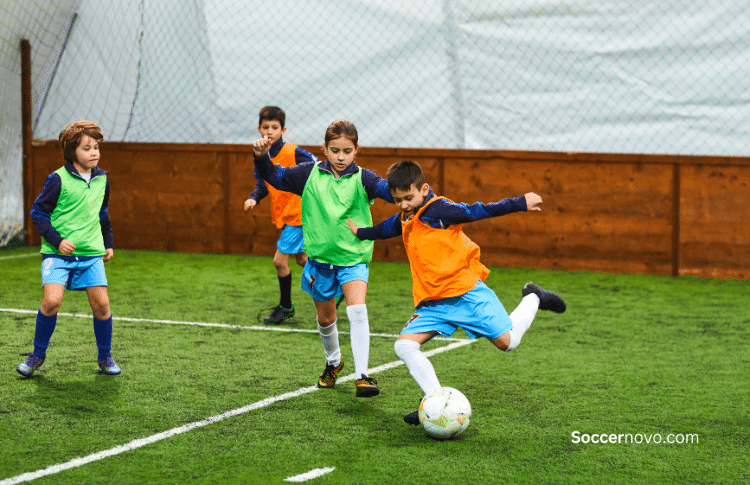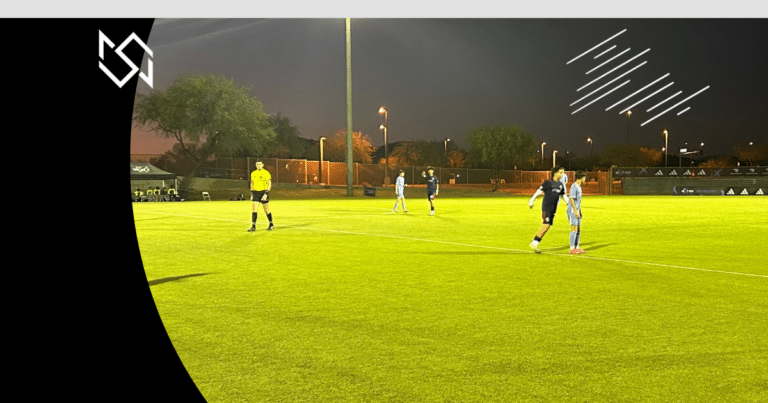How to Be a Better Defender in Soccer
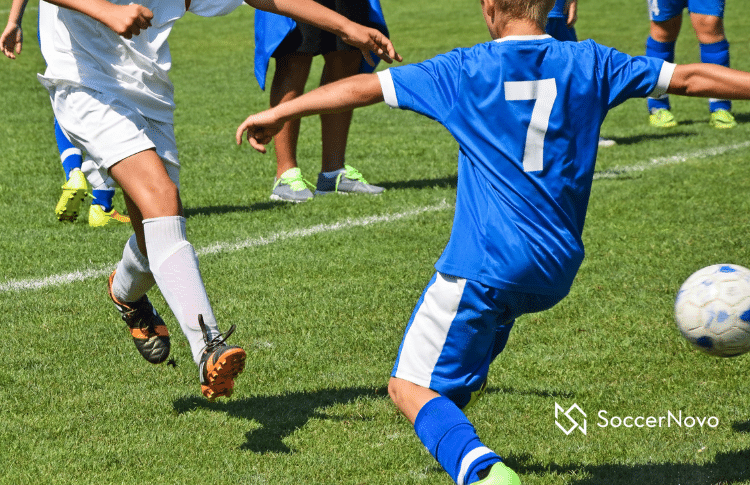
Being a better defender in soccer can make all the difference in teams winning and, more importantly, a player’s development.

Whether you’re a beginner or an experienced soccer player, there are always ways to improve your defensive skills on the field.
Key Takeaways From This Article:
- It doesn’t matter what position you play, improving your defense makes you a better player.
- You don’t have to be big and strong to be an elite defender. IQ, anticipation, tenacity, and skills are also part of the recipe.
- Being mentally strong can help you excel as a defender in soccer.
In this article, we’ll explore some tips and strategies for becoming a better defender in soccer.
The Basics of Good Defender in Soccer
Before we get into the guts of the article. Let’s understand what it means to be a good defender.
First, it’s important to understand that defending is not just about stopping the opposing team from scoring.
It’s also about preventing them from gaining possession of the ball in the first place. This means being aware of your surroundings, anticipating your opponent’s moves, and positioning yourself strategically on the soccer field.
Here’s a good video on some defending hacks…
When the ball is received by an offensive player, a well-timed tackle can disrupt their attack and give your team a chance to regain possession.
However, it’s important to remember that slide tackling should be a last resort, as mistiming a tackle can result in a foul, a counter-attack, or even a red card. No bueno!
Defensive Positioning
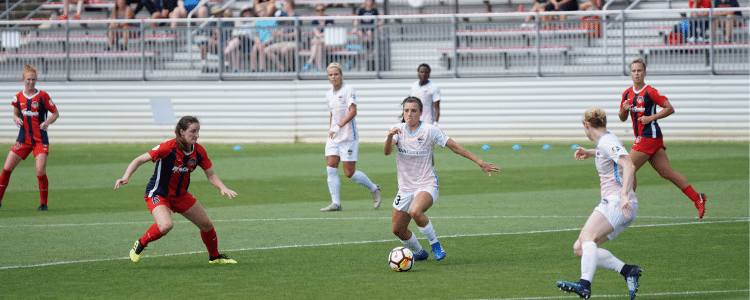
Stance and Footwork
One of the most important aspects of being a great defender is having a solid stance and footwork.
A good defensive stance involves keeping your feet shoulder-width apart, with your weight evenly distributed between both feet. Your knees should be slightly bent, and your body should be leaning forward slightly.
In almost any sport, a defensive stance is critical to move laterally, sideways, and turn to sprint on a dime.
When it comes to footwork, it’s important to be light on your feet and able to move quickly in any direction. This means taking short, quick steps and being able to change direction at a moment’s notice.
Practice shuffling side to side, moving forward and backward, and pivoting on one foot.
Body Positioning
When defending, it’s important to stay between the attacker and the goal, while also maintaining a safe distance.
If you’re too close to the offensive player, there’s a chance they’ll just burn by you.
If you’re too far, they have time and options to create plays whether it’s a simple pass, through-ball, shot, or dribbling to make you bite.
Your body should be low and your arms out to the side, creating a barrier between the attacker and the goal.
It’s also important to stay aware of the attacker’s movements and be able to react quickly. This means keeping your head up and your eyes on the ball, while also being aware of the attacker’s body language.
I see so many defenders get “tricked” by the offensive player’s upper body movements. Always look from the waist down. Get the offense to make the first move then attack when they are most vulnerable.
Soccer Tackling Techniques
Slide Tackles
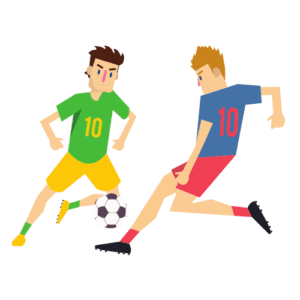
Slide tackling is a high-risk, high-reward move that can be incredibly effective if executed correctly.
When attempting a sliding tackle, it’s important to time your slide perfectly to avoid a foul and/or injury.
Aim to make contact with the ball, not the player, and slide in from the side to avoid endangering the opponent.
It’s important to note that sliding tackles should only be used as a last resort. If you can win the ball with a standing tackle or interception, that is always the safer option.
Standing Tackles
Standing tackles are a more conservative approach to defending, but they can be just as effective as slide tackles.
When attempting a standing tackle, focus on getting your body between the opponent and the ball.
Use your non-tackling foot to block the opponent’s path and make contact with the ball using your tackling foot.
Timing is crucial when attempting this type of tackle. If you mistime your tackle, you risk giving away a free kick or allowing the opponent to get past you.
Other tips to improve your tackling:
- Stay on your toes and be ready to react quickly
- Keep your eyes on the ball
- Stay low and be prepared to change direction quickly
- Don’t lunge into tackles, as this can leave you off-balance and vulnerable to a counter-attack
- Use your shoulder to bump the opponent but don’t extend your arms (or you’ll be whistled for a foul)
Communication and Coordination
Communicating with Teammates
Effective communication is key to being a successful defender in soccer. This is especially true if you are the center back of your team.
It is important to communicate with your teammates both on and off the ball.
When you are on the ball, you should be vocal and let your teammates know where you are and what you are doing. This can help your teammates anticipate your actions and make better decisions.
When you are off the ball, you should be communicating with your teammates to help organize the defense.
This includes calling out the position of the opposing team’s attackers, letting your teammates know when to mark a player, and communicating when to switch positions.
Clear and concise communication can help prevent confusion and mistakes.
Also, the delivery of your communication is important. I’ve seen players who communicate but do it in a way that sounds negative, bossy, and whiny. My son has played with kids like this. They mean well but their delivery is off-putting and their teammates stop listening or argue back. It’s not a great dynamic.
Instead, be positive and state facts such as “There’s two behind you, mark #11, or I have the striker”.
Working with the Goalkeeper
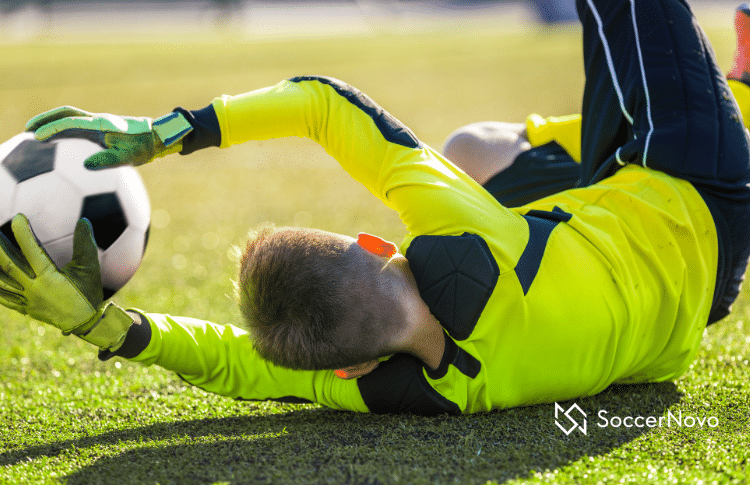
As a defender, you must also work closely with the goalkeeper to ensure that the defense is organized and effective.
Communication with the goalkeeper provides a unique perspective on the field and can be valuable information to the entire defense.
When the opposing team is attacking, the goalkeeper may call out instructions to the defense, such as when to step up or when to drop back.
As a defender, you should listen to these instructions and adjust your position accordingly. The goalie sees more of the field since they are the last line of defense.
In addition, you should communicate with the goalkeeper when defending set pieces, such as corner kicks or free kicks.
This includes letting the goalkeeper know who you are marking and who they should be watching.
Anticipation and Studying the Game of Soccer
As I mentioned above, anticipation is a crucial skill for any defender in soccer.
It involves being able to predict what the opponent is going to do before they do it. This can be achieved through careful observation of the opponent’s movements, body language, and positioning.
By anticipating the opponent’s moves, a defender can position themselves in the right place at the right time to intercept the ball or make a clean tackle. This can often lead to a counter-attack started by the defensive line.
One way to improve your anticipation skills is to watch game footage. Identify opportunities where you could inject yourself to try to steal the ball.
This will help you to identify their playing style and tendencies, allowing you to anticipate their moves more effectively.
Lastly, some players just have a knack for the game and can anticipate well. But, I also think the more you play and train, the better you will anticipate. At the end of the day, I find that the players that anticipate well are always focused, are thinking a step ahead, and constantly moving.
Physical and Mental Prep
Strength and Conditioning
Like any position in soccer, being a defender in soccer requires a lot of physical strength and endurance.
Therefore, it is important to have a proper strength and conditioning program. This program should include exercises that target the muscles used in soccer such as the legs, core, and upper body.
Some basic exercises that can be included in the program are:
- Squats
- Lunges
- Planks
- Push-ups
- Deadlifts
It is also important to incorporate cardiovascular exercises such as running and sprints to work up your endurance muscles.
Mental Toughness
Being a defender in soccer is not just about physical strength, but also mental toughness.
Defenders need to be able to stay focused and maintain a positive attitude even when things are not going well.
In many cases, the defending positions are the ones coaches blame for goals. But, it’s usually a culmination of things leading up to the goal.
Some ways to improve mental toughness include:
- Meditation
- Visualization
- Positive self-talk
- Goal setting
- Stress management
- Having a short-memory (getting over plays is essential to defending well on the next play)
Best Defenders in the World
Now, let’s take a look at some of the best defenders in professional soccer. If you are a defender, I suggest watching these guys and learning from their game to speed up yours.
- Marquinhos (Paris Saint-Germain): This Brazilian center-back who currently plays for PSG. He is known for his versatility, as he can also play as a defensive midfielder or right-back. He is a strong and agile defender, with good tackling skills. He is also comfortable on the ball and has good passing ability, making him an important part of PSG’s build-up play. He has won numerous titles with PSG, including seven Ligue 1 titles and reached the Champions League final.
- Virgil van Dijk (Liverpool): The Dutch center-back is widely considered as the best defender in the world right now. He is a towering presence at the back, with exceptional aerial ability, strength, and composure on the ball. He played a pivotal role in Liverpool’s Champions League triumph in 2019 and their Premier League title win the following year.
- Kalidou Koulibaly (Napoli): The Senegalese center-back is a dominant force in the Italian Serie A, known for his strength, pace, and aerial ability. He is also comfortable on the ball and has excellent positional sense. He has been linked with moves to top European clubs, including Manchester City and Liverpool.
- Aymeric Laporte (Al Nassar): The French center-back is one of the most consistent defenders in the Premier League, with excellent defensive skills and a calm presence on the ball. He has been a key player for Manchester City since his arrival in 2018, helping them win two Premier League titles and reach the Champions League final in 2021.
- Trent Alexander-Arnold (Liverpool): The English right-back is a unique talent, known for his exceptional crossing ability and creativity going forward. He is also solid defensively, with good positional sense and tackling skills. He has won numerous titles with Liverpool, including the Premier League and Champions League, and is widely regarded as one of the best right-backs in the world.
Final Thoughts on Defense
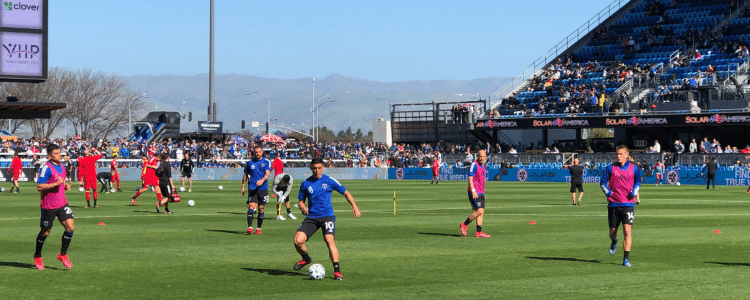
Every good defender will always have a spot on a soccer team. Many talented players are known for their flashy offensive skills but it’s the defense that makes a bigger impact on games.
For those youth soccer players who may need to refine their offensive skills, defense is a great way to get more playing time. For elite offensive players, making an effort to make more tackles will give you more opportunities on the ball.
In your training sessions, start making it a point to start reading the game and anticipating plays. In your one-on-one drills, prioritize your tackling techniques and make hard, clean tackles.
At home, continue working on your footwork and ball skills. Being able to maneuver in tight spaces can give you the extra skill set to make you an elite defensive player in your league.
I’m confident if you take these tips and suggestions to heart that you’ll be a better player. I’ve seen many players improve their overall game by making more of an effort on defense!
Frequently Asked Questions
Is defense important for a forward in soccer?
What is considered a defensive position in soccer?
Can I slide tackle in soccer?

Written By: SoccerNovo
SoccerNovo is an independent youth soccer media brand built to help parents, players, and coaches better understand the game and the pathways available in U.S. soccer. Our mission is to make youth soccer simpler, clearer, and more accessible for everyone involved in it.
Let’s connect


